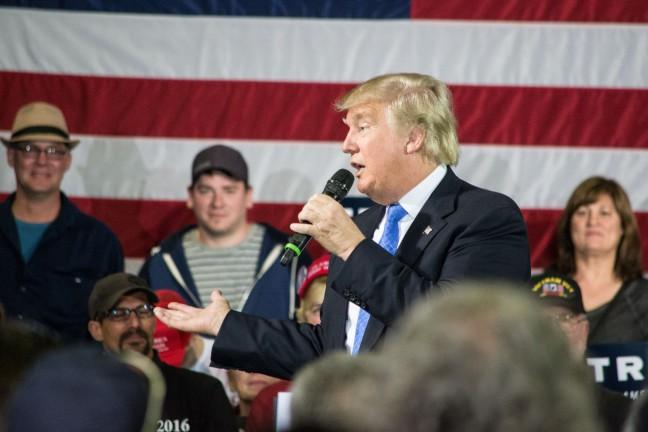As a student of history, I’ve spent countless hours studying the rise of different political movements in the United States and across the world. The Republican Party, as I’ve known it, is an engine for conservatism. The conservative movement, which I identify with, rose to prominence through the voices and writings of powerful figures like Barry Goldwater, William F. Buckley, Milton Friedman and, most importantly, Ronald Reagan. Paul Ryan, Ron Johnson and Scott Walker are all a part of this movement.
Conservatism is still strong within the Grand ‘Ole Party, but the rise of President-elect Donald Trump could be a turning point from its current primary ideology.
A very telling example are the recent comments made by Stephen Moore, the chief economist at the Heritage Foundation and an adviser to Trump during the campaign. At a luncheon with Republican lawmakers, he said the Republican Party is no longer the party of Reagan.
It shocked many in the audience, as Moore is known as a popular advocate for supply-side policies that were enacted during the Reagan era. Such a statement should not be ignored. Trump could change the Republican Party for the next several decades.
The biggest question, of course, is will he?
I, along with many right-leaning Wisconsinites, voted for Ted Cruz in the Wisconsin primary because I did not see Trump as a Republican at all.
Cruz has been active in Republican politics for years, while Trump spent many years as a Democrat before a sudden transformation in 2011 when he began attacking President Obama over his economic program and his birth certificate. Trump did not run in 2012, but was interested. He decided that 2016 was his moment, and he was obviously correct.
His appeal to blue-collar workers comes from a mixture of populism and nationalism. There have been movements in the past that equal Trump’s in some sort of way.
Karl Rove, an adviser to President George W. Bush, compared Trump to Democrat William Jennings Bryan in 1896. Bryan, like Trump, attacked the political establishment of his age. Both appealed to workers who believed that they weren’t being heard. Bryan, however, failed as a presidential nominee three times. Trump has succeeded during his first time at bat.
Now, a month later, voters and political analysts are still scratching their heads. What was the secret?
Trump owes his base of supporters. That means doing what he can to save jobs and bring back manufacturing to the United States. This is going to be extraordinarily difficult, but a recent deal between Trump and Carrier gives us a hint of what to expect.
Carrier, a manufacturing firm that focuses on heating and air conditioning, was set to close a factory in Indiana and open a new one in Mexico. It is a typical story of what has happened to many manufacturers in the United States with the rise of free trade. Moving to Mexico would lower the cost of doing business, but Trump has managed to save the factory and most of the jobs.
While handing out tax incentives and subsidies to companies that want to move overseas will keep blue-collar workers happy, it does break from supply-side economic policies. Sarah Palin, 2008 Republican for vice presidential candidate and early supporter of Trump, is surprisingly one of the first to attack his deal with Carrier because the government is getting too deeply involved with the market. Government intervention could lead to the rise of crony capitalism by rewarding companies that threaten to close factories in America while building new ones elsewhere.
Lawrence H. Summers, an economist at Harvard University and former Treasury secretary, has explained that Trump’s nationalist economic views aren’t capitalism by the rule of law that we have experienced in the United States for decades.
Rule of law capitalism is a system that involves the rationalism of purchasing cheaper goods and services while defending property rights and enforcing contracts between two or more parties.
Summers believes Trump will bring a system called ad hoc capitalism. This is an economic model that moves away from the free market conservatives support. Nationalists often use ad hoc capitalism to enrich themselves and their supporters through favoritism to domestic companies. This means a leader uses leverage as a tool of policy rather than competition.
The problem with such a policy is that it rewards a small portion of the American population while costing others more. Tim Worstall, a fellow at the Adam Smith Institute in London who calls Trump’s policies folk economics, has noted consumers won’t receive a lower price for air conditioners. If Carrier had moved to a new location where the costs of labor are smaller, then they could’ve lowered prices for people who need their products. While the factory workers win, the consumers lose.
We don’t know how impactful Trump will be or where he will take the Republican Party, but there is a risk that his administration will be deeply divided.
On one side stands Republican National Committee chairman Reince Priebus, who will be Trump’s Chief of Staff. He represents the Republican Party’s traditional conservative views. On the other side stands Trump campaign CEO Steve Bannon, who will be his chief strategist and counselor. He represents the rising tide of nationalism within the GOP. The next four years will determine who has more influence over the president and which faction wins. Either way, in four years, the GOP will likely be unrecognizable.








